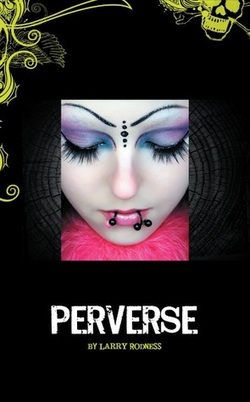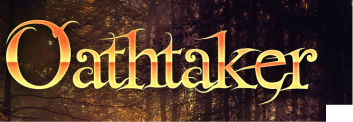
Hello, Larry. Thank you for taking the time to visit with me. Your most recent work, Perverse, features an uncommon “second generation Goth” as its main character. The glimpse you provided readers into the Goth culture was unique. What character in Perverse would you say most surprised you and why?
When I write it generally begins with a kernel of an idea which takes me on an adventure. As the story develops, so do the characters who begin to speak and react according to the situations they find themselves in. So your question is well taken in that I’m never sure about them until they reveal themselves to me. Given that, two characters stand out for me – the first being Emylene Stipe, the 19 year old Goth who carries the story. One of the tasks I set for myself was to create a protagonist as different from my voice as possible and I was pleasantly surprised that readers related to Emylene as a complex young female. However I was most surprised by the character of Laszlo. He began as a vengeful, bitter, old man. But when I started to explore his background and the forces that drove him, I learned to appreciate his personal journey and the many facets of his character.
People sometimes ask me how I come up with my stories. I, like you, have found it interesting how the process sometimes means creating the outline of a character and then waiting for that person to reveal himself more fully. Often, events occur that were not pre-planned. Rather, they come about at the instigation of the characters themselves. Were there such events or other things in your work that you found flowed from the tips of your fingers without your having been aware they were coming? If so, how did you react when those things happened and did that change the story you thought you were going to tell?
To tell you the truth, the first third of the book came rather easily. Then I had to put the story down for about six months because I was not sure where to go with it. After my wife and I returned from our first trip to Europe and visited Italy and the Greek Islands things began to suggest themselves. It wasn’t long before the rest of the story started to flow without interruption.
Interesting. On occasion I have found that setting a work aside for a time gives me the opportunity to come at it later with fresh eyes and a new approach. I wonder sometimes if my subconscious was busy all along and I just didn’t know it! So, perhaps your trip influenced the story in ways you cannot readily identify. . . .
Perverse is set in the current day and time, but I am curious. What “other world” (which could be a time, place or fantasy place) created in any book you’ve written or read, is the world you would most like to visit—and why?
I’ll answer this in another way. I would love to visit the world ten years after I die so that I could look in on everything from my family’s personal dynamics to world economics. Ten years would be soon enough for me to relate to and long enough for me to appreciate the changes.
Fair enough. When I look back ten years, I am amazed at all the things that have changed since then—new technology, changes in world politics, and so forth. I’m not sure I can even imagine the world ten years from now—so I guess I will leave that to the sci-fi writers. . . . (I wonder—will they write what was to come to pass anyway? Or, will what comes to pass have been influenced by or be the result of their visions?)
To change the subject, what work created by someone else do you most wish you had written?
I wish I had written “Satisfaction” by the Rolling Stones because it’s a song filled with humor, intelligence and drive. I also wish I had written the Golden Rule (do unto others as you would have them do unto you) because that’s the single most important maxim that we as humans can aspire to.
That’s funny—your choice being a song—but then you are a musician—a professional singer, are you not? And you write musicals. So, I suppose your response should come as no surprise. As to your second choice—ancient words—Biblical words. (I wonder, are you saying you wish you had written that great work?!) When considering literary works to which mortal man could aspire to write—what would you consider the five best works you have ever read and why do you rank them among the best?
- Catch 22 by Joseph Heller showed me how perverse life can be when taken to its logical extreme.
- The World According to Garp by John Irving is a wonderful character-driven story - and I was also a high school wrestler so I could identify.
- To Kill A Mockingbird – for the memorable characters and the ugly truth it revealed about life in the South during the fifties.
- The Hobbit + it’s sequels by JRR Tolkien are most memorable for the fact that these novels swept me away to another world I never wanted to leave.
- The Da Vinci Code by Dan Brown. I appreciated all the work and research the author put into his story and the fact that the climax was not only a magnificent surprise but grew organically out of the original premise. The characters were not complex but they served to tell a unique story, the stakes of which were universal. One of the few books I could not put down after I started it.
That is always the goal, isn’t it—to select a book that you cannot put down. Personally, I am always drawn to larger works. My goal is not to finish a story—it is to be lost in a story—and the best are those I do not want to have end. I am delighted to find of late, series that were originally published as separate books, now bound in a single copy. Those 12-1500 page items draw me like a magnet. Even so, the most important thing is to be entertained. What do you do when you pick up a work that does not entertain you? Do you read to the bitter end or do you bow out early?
I pick up a book hoping to get lost in the pages. When the writing no longer inspires me to turn the page I close the book and look for something else.
So, from among those stories that have most inspired you, who is your favorite heroic character—and in what way are you like him or her?
A hero is measured by a number of things. It might be in contrast to the strengths of his nemesis or the struggles he attempts to overcome or the selfless sacrifices he makes. Sidney Carton from “A Tale Of Two Cities” comes to mind. I wish I could be as noble but I doubt it. The other night I was watching “I Am Legend” which is a remake of “The Omega Man” which was originally a novel. The hero, Robert Neville, is the last man on Earth trying desperately to save humankind from vampires by developing a vaccine that reverses the virus. In the novel the hero is faced with a number of struggles at the same time – fending off vampires, trying to create a cure, and trying to keep his sanity. I was in my teens when I read the novel and the ending always stuck with me – Robert, a modern day Christ figure, sacrifices himself so that the few surviving humans he meets have a chance to escape and regenerate the population. Why am I like him? Not because I am a hero, nor do I see myself as a Christ figure. But because ever since I was a child I’ve had nightmares of vampires. One day, like Robert Neville, I would like to vanquish them from this earth forever. Of course there would still be zombies.
Ha! Nightmares of vampires! I confess my surprise to have discovered vampires in Perverse, as I did not know that was where the story was headed. So, if you want to rid the world of them, I suspect you might not find your favorite villain from amongst that group. Who then would you say is your favorite literary villain—and here’s the twist—in what way are you like him or her?
One of my favorite villains is Hannibal Lecter. He’s a creature who is not only confident and self-aware but revels in it. He is cultured and intelligent, he does not suffer fools, yet he is not unappreciative of his worthy adversaries. The best villains for me are those who are not simply evil but who are revealed to be people who by nature or circumstance make the wrong choices and are compelled to see their misguided plans to the end. It’s the flaw in everyone and the conflicts they must deal with that makes characters interesting. How am I like Hannibal Lecter? Let’s talk about it over dinner.
Thanks anyway, Larry. I think I’ll pass on dinner. . . .
So, to wrap up, I have a few final questions. The first is: what one question have you always wished an interviewer would ask you that you have not been asked—and what is your answer to that question?
“How do you write women so well?”
“I think of a man…and I take away reason and accountability” – from As Good As It Gets. I may never be asked that, nor would I necessarily answer in the same way, but for that character, it was a brilliant piece of business.
That’s interesting. (Take away reason and accountability. . . . ? Hmmmmm.) Okay then, what one question do you most dread an interviewer asking you—and what is your answer to that question?
I would most dread being asked what my favorite color is and what my sign is because that would denote that my interviewer is an idiot. (By the way my favorite color is green and I am a Sagittarius. Now no one has to ask me.)
Right—and should someone make the mistake of doing so—you can direct them here! So, Larry, one final question: what one lesson, theme or principle, if any, did you most want others to take from your most recent work?
The title of my second novel is Perverse. If I have done my job well I would want my readers to walk away saying I had taken them on a journey they had not expected, and there were surprises at every turn.
Thank you so much, Larry, for taking the time to visit today. Best of luck to you with Perverse.
Find out more about Larry, follow or fan him, on Goodreads here.
Find Perverse on Amazon here and on Barnes and Noble here.
Take some time to check out Larry's website here and his publisher's site here.

